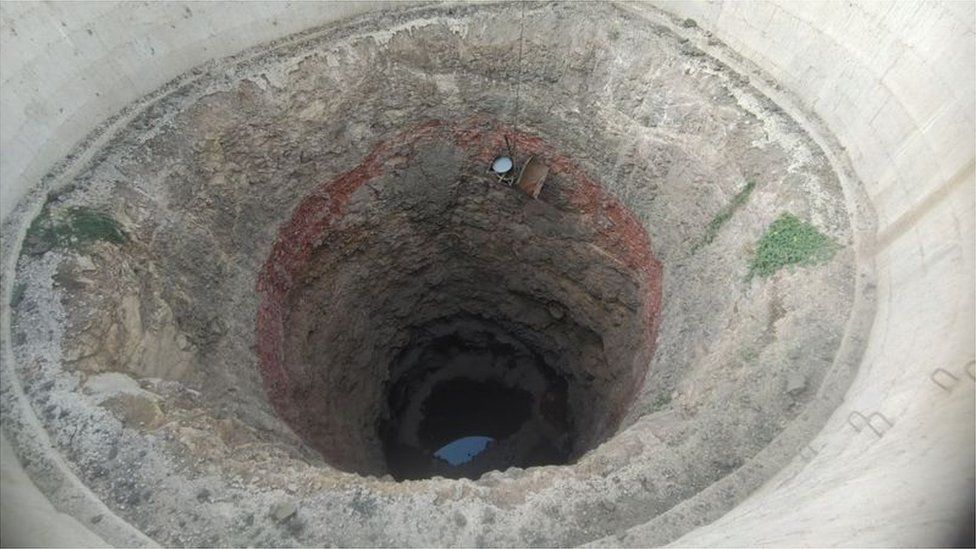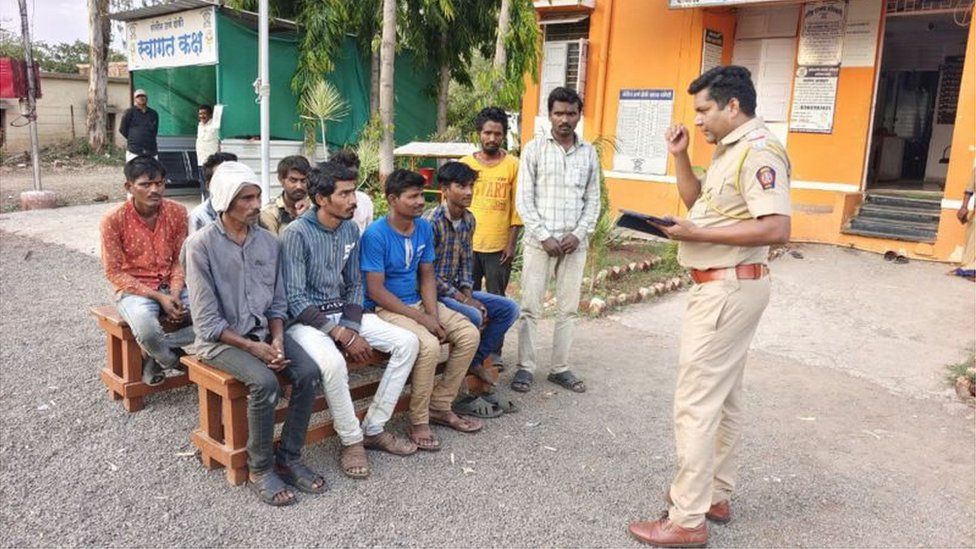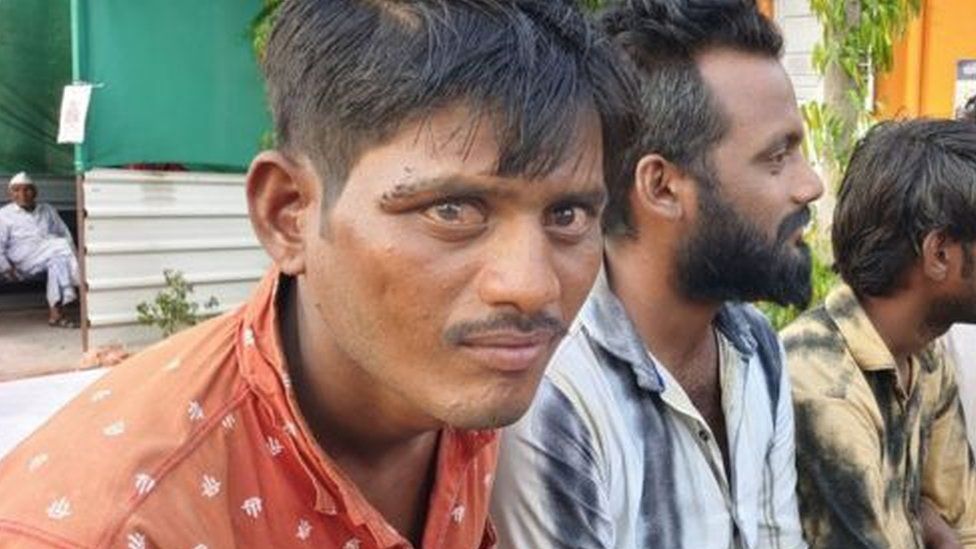Bhagwan Ghukse decided to flee for his life after being startled awake on a sweltering June night.
Mr. Ghukse had been imprisoned in a filthy shack in the western state of Maharashtra for the previous month along with six other daily wage workers. The workers were initially hired to dig wells in the state's Osmanabad district by some contractors, but they were later forced into bonded labor, which is prohibited in India.
Mr. Ghukse described the inhumane living conditions, including being beaten, drugged, and compelled to perform hard labor for long periods of time without access to food or water. The workers would be chained to the tractors at night so they couldn't flee. In addition, Mr. Gukse claimed that the men would forcefully sedate them with alcohol after lashing them with sticks if they were unable to fall asleep due to pain, hunger, or exhaustion.
"Death was going to happen here, I knew that. But before that, I wanted to at least try to get away," he said.
However, Mr. Gukse and the other prisoners would exhaust themselves from work, beatings, and lack of food to the point where they would be too exhausted to even consider escaping.
However, on June 15 or 16, Mr. Ghukse decided to give it a try. He reached for the small lock of the chain on his feet, slid a finger inside, and continued twisting it for hours until it finally came loose. Unfortunately, he can no longer recall the exact date because the days had long since begun to blend together.
He made the decision to head in the direction of a sizable sugarcane field as he scrambled out of the compound. "I didn't know where I was. I was only aware of the need to return home. I ran along the field's edge, following a railroad track. ".
After Mr. Ghukse arrived in his village and reported the torture to the police, authorities were able to free 11 additional workers from two different locations run by the same contractors.
According to local police official Jagdish Rao, who is in charge of the case, "at first we didn't believe the laborer, but when we reached the location, we were shocked to see the conditions of the men.".

According to the police, the men were chained and subjected to repeated acts of physical and mental torture after being made to work 12 to 14 hours a day digging the wells. They had to relieve themselves inside the wells they were digging because there were no toilets available, and after finishing their work, they had to clean up the waste. Most of them had deep gashes and blisters on their eyes and feet, and some of them were being treated in hospitals.
In connection with the case, which has been making headlines in India all week, seven people, including two women and a minor, have been charged with human trafficking, kidnapping, abuse, and wrongful confinement under the Indian Penal Code. The minor is in a juvenile detention facility, two are evading capture, and four are in police custody.
The victims, according to the police, were all low-wage daily workers who arrived in Ahmednagar, a town close to Osmanabad, in search of employment. They were contacted by a representative who later sold them to some contractors from Osmanabad for 2,000 to 5,000 rupees (between $24 and $60) each.
The agent promised the workers that in exchange for digging the wells, they would receive 500 rupees and three meals each day. When the men agreed, he called them to a gathering place, loaded them into a tuk-tuk, injected them with alcohol, and then drove them off to various locations.
They had their phones seized and their official documents taken by the contractors at the well compound.
Mr. Rao said, "The accused would release the men without paying them a single penny, after keeping them in such horrible conditions for two to three months." He added that they were looking into whether any other locations in the neighborhood were still carrying out similar practices.
The BBC was informed by the families of three laborers that they had reported their loved ones missing but that the police had declined to launch an investigation.
A police official told the BBC under the condition of anonymity that the police had not responded to the case's allegations in a timely manner. However, the police did not respond to BBC requests for comment.
The workers claim that even weeks after their escape, they have not yet processed the trauma. Many of them claim they are constantly slipping into hopelessness when they think about the torture despite their best efforts to rebuild their lives.
One of the laborers who was saved, Bharat Rathor, laments, "We were treated like slaves," while displaying his injuries, including a swollen eye and blisters that were wide open on his feet.
The contractors used to beat us until we were nearly blind almost daily while giving us stale chapatis (flatbreads) with salt and a few pieces of brinjal. Our pitiful state was occasionally observed by farmers from nearby fields, but no one made an effort to assist us. ".
After the passing of his father, Mr. Rathor claims he moved to Ahmednagar in order to care for his ailing mother. God only knows how I managed to survive the circumstances I was in. ".

His experience is comparable to Maruti Jatalkar's, who was also forced to leave his home in the Nanded district due to his financial situation. Mr. Jatalkar's older daughter, a farmer, was set to marry in May. Since there was no work in his village during the summer, he went to Ahmednagar in search of employment and was hired by the agent.
His goal was to earn enough money to pay for the wedding if he worked at the well for 15 to 20 days.
However, after being saved, he discovered that his daughter had already been married off, so he was unable to do either. I cried a lot that day, he admitted.
When he considers the time he spent at the well, which was almost two months ago, Mr. Jatalkar claims he still gets scared.
"They would send us inside in the early morning hours and only permit us to leave at night. There, we used to go potty and urinate. They would beat us and tell us we would only receive one meal if we asked for food. ".
The National Human Rights Commission (NHRC) censured the state government last week and ordered authorities to give the workers relief under the nation's labor laws. Despite the lingering pain, the workers claim they are hopeful about a fresh start.
Mr. Rathor declares, "We'll find work in our villages in the interim and earn what we can. Possibly, things will improve soon.
. "







